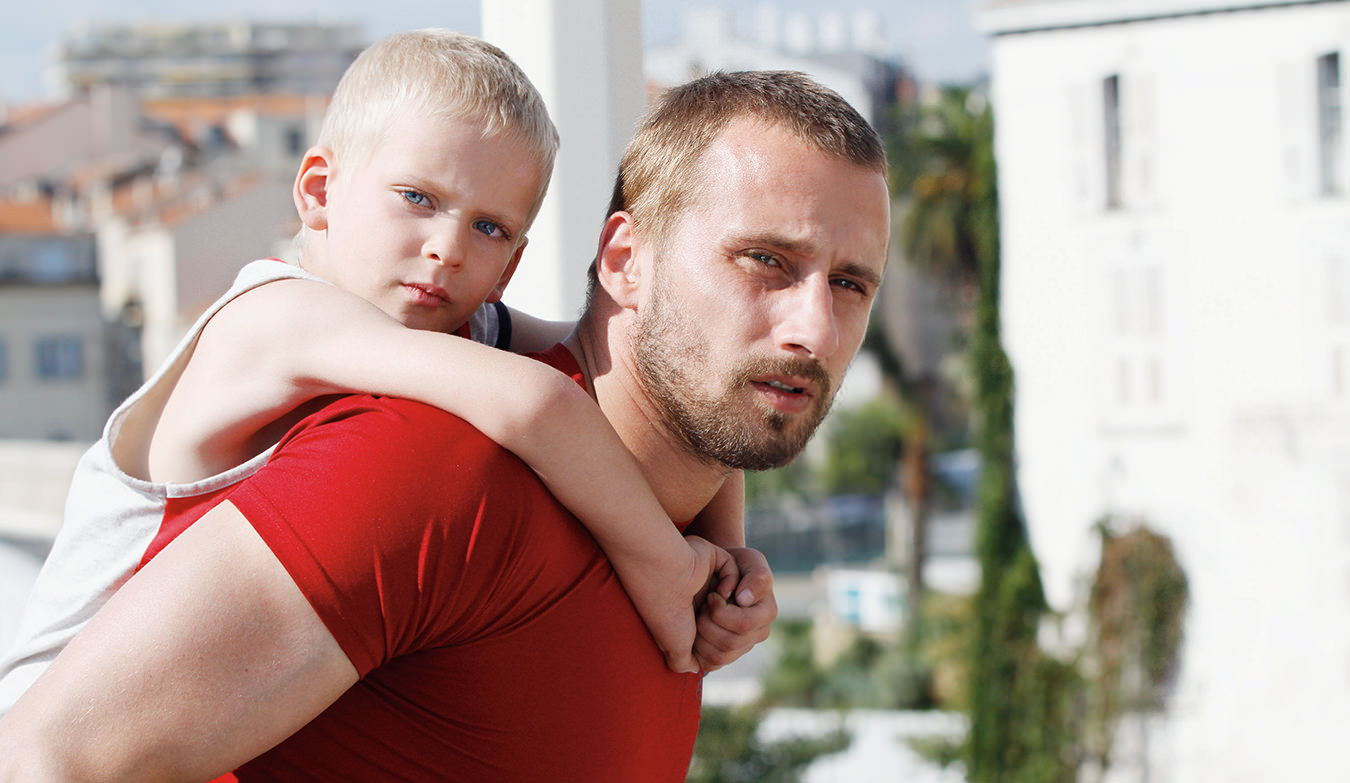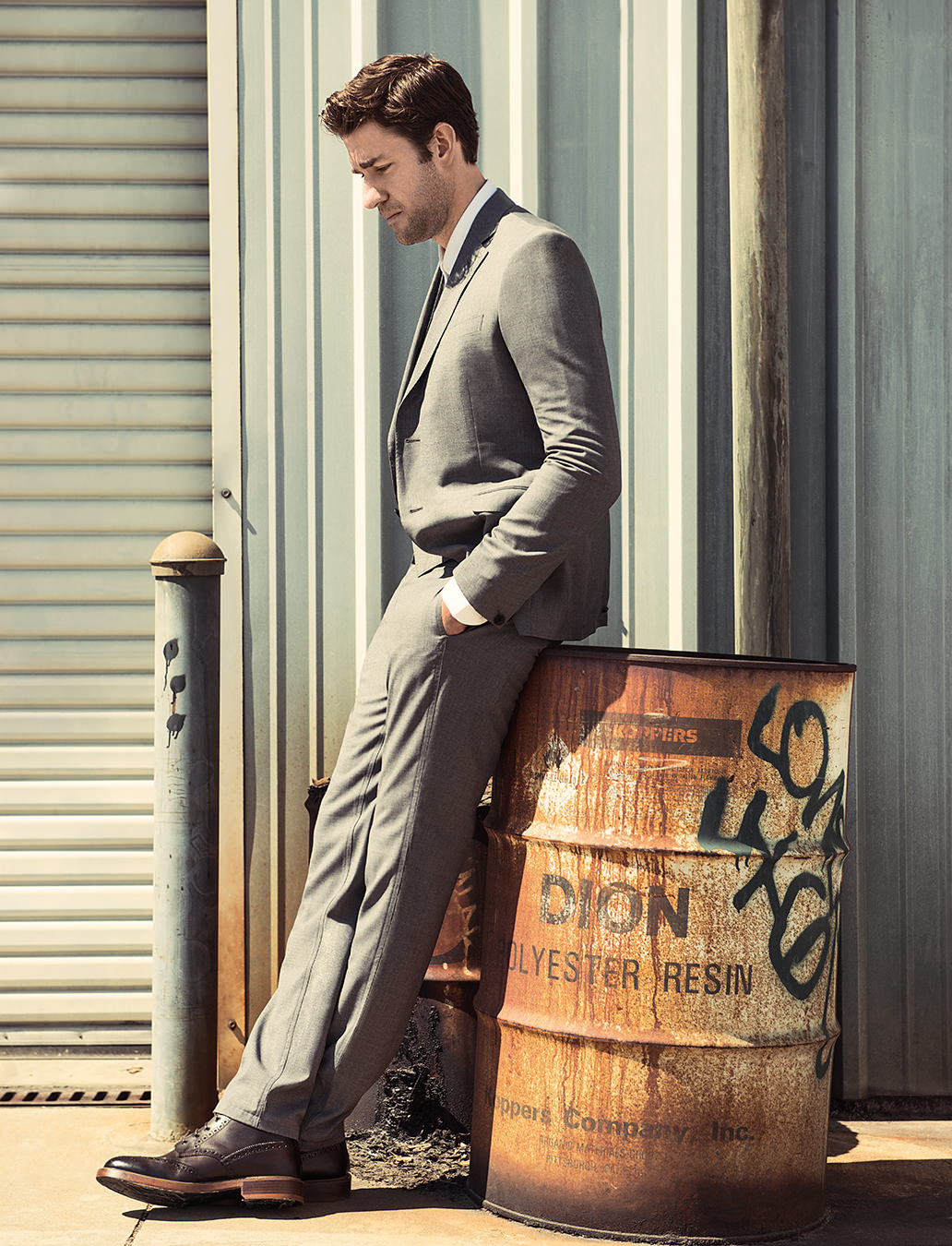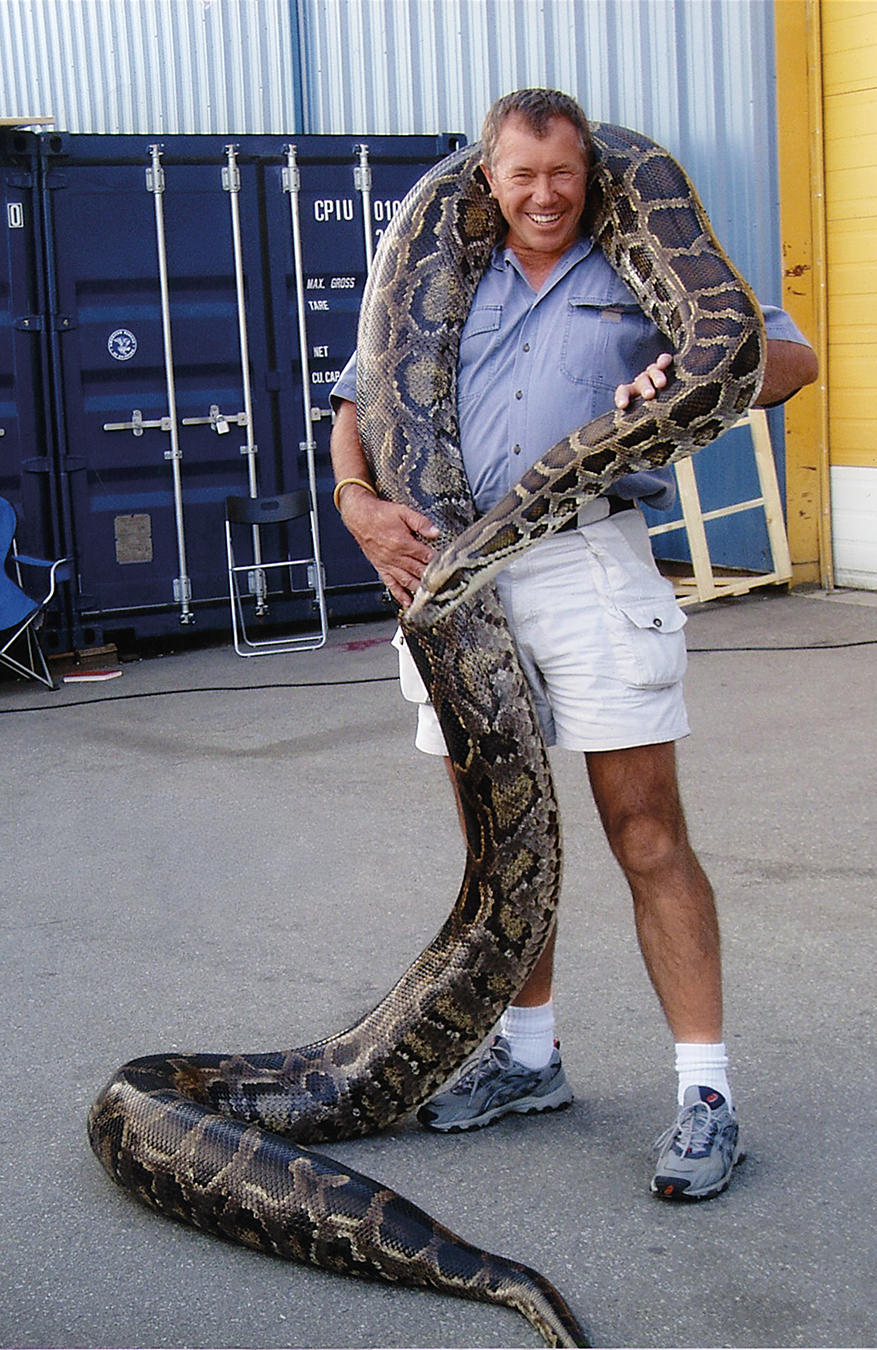-
-
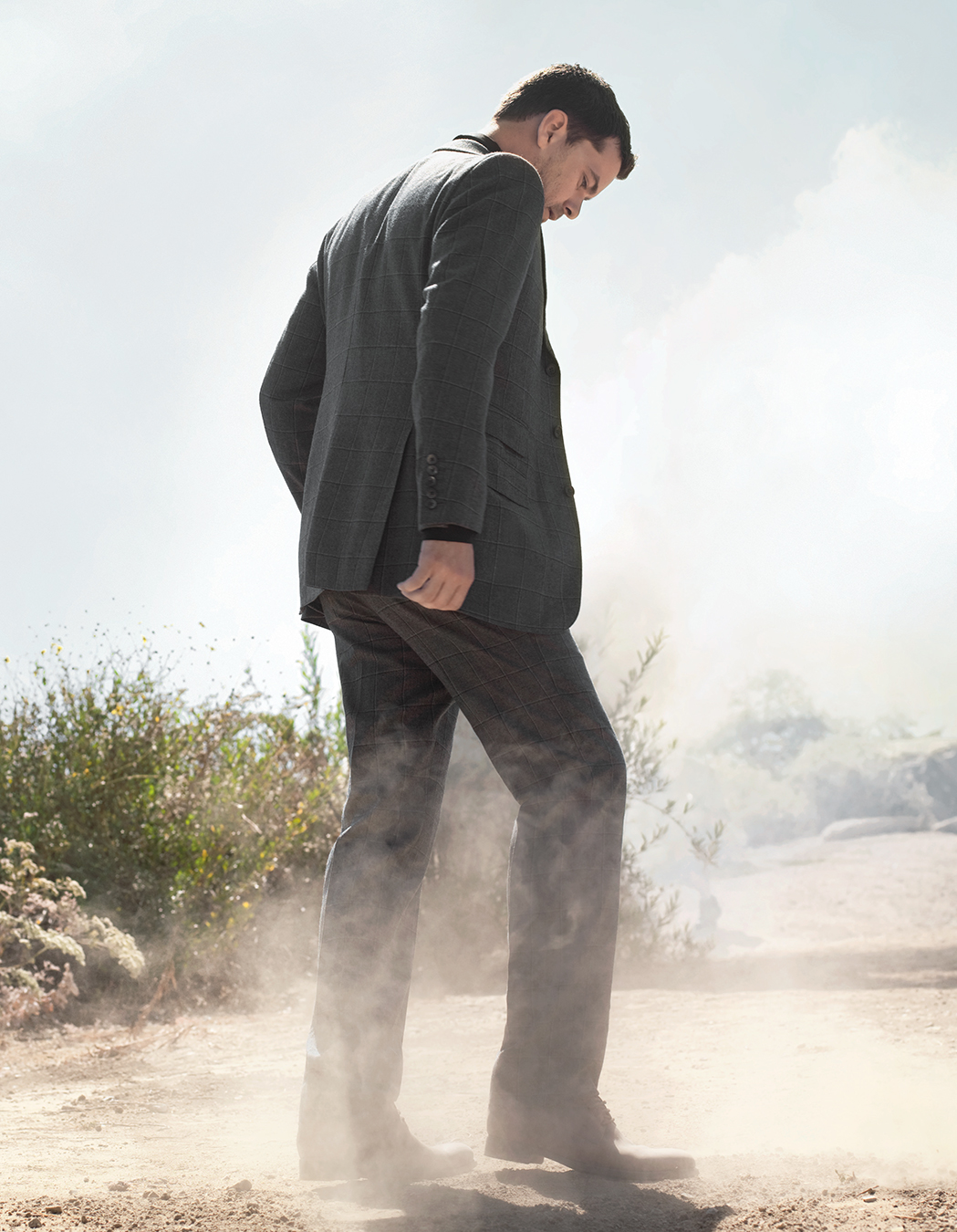
Jackson wears Tom Ford three-piece suit, Martin Margiela shirt, and Buttero boots.
-
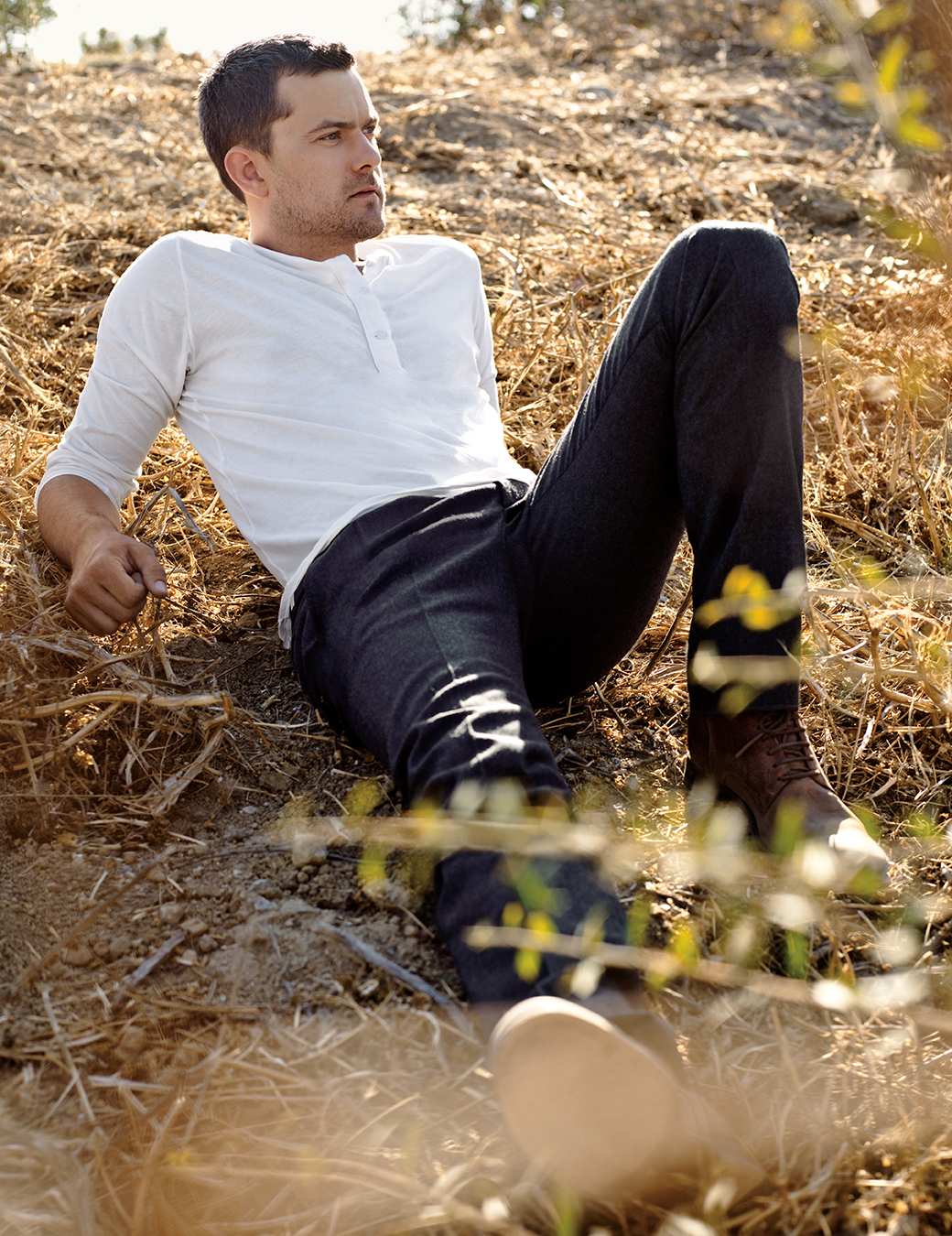
-
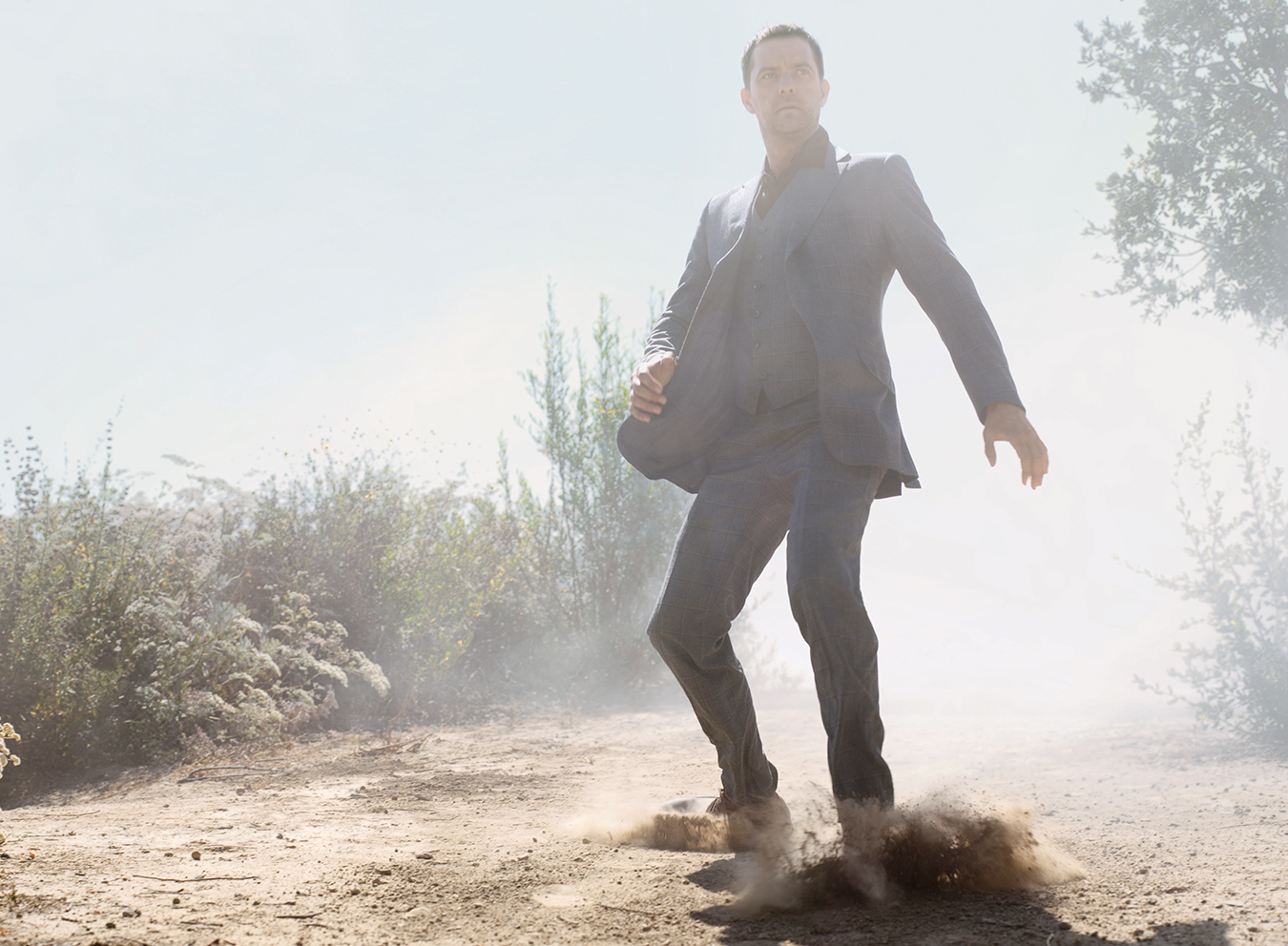
Jackson wears Tom Ford three-piece suit, Martin Margiela shirt, and Buttero boots.
Joshua Jackson
Free spirit.
Joshua Jackson is in the mood to muse. He’s got a lot on his mind—the deep meaning-of-life sort of stuff that sci-fi geeks typically ponder at 2 a.m., after smoking too much weed. Except it’s early on a summer evening, and we’re sipping sparkling water in the penthouse garden of the Soho House on West Hollywood’s Sunset Strip, when the phone rings and Jackson suddenly notices the time.
His live-in girlfriend of four years, German movie star Diane Kruger, is on the phone, and he’s due at a screening of her latest film, Inhale. “Hi, love, can I have 15 more minutes?” he asks.
It’s clear the answer is no. “Such is life,” he tells me. “You can’t be late for Germans. Doesn’t work.”
Relationships come first now for Jackson, star of the hit TV science-fiction series Fringe, who is also well known for playing wisecracking teen Pacey on Dawson’s Creek. “That was a falling-down point for me with women in the past,” says the actor, sporting a scruffy beard, jeans, and checkered shirt. “My work is so hit-and-miss, you get caught up in this idea, when it’s here, everything else goes to second best. With Diane, I’ve made sure she stays in the premier position. And all of a sudden I’ve realized, oh look, I can have a life and do my job. This is really nice.” In fact, Jackson and Kruger are currently contemplating whether that life should include starting a family. “It’s a topic of much debate in my household,” he says. The desire is there, but with such demanding careers, the timing may not be right. “It doesn’t seem fair to be, like, hey, you’re knocked up—I’m just gonna go work 14 hours a day for the next 10 months, and by the time I get back, I expect there to be a weaned child, okay?”
For now, Jackson is enjoying the fact that Fringe, which is entering its third season this fall, has brought him back to his birthplace of Vancouver after a peripatetic youth that took him up and down the West Coast of North America and across the Atlantic to Ireland. The show has also reunited Jackson with his mother (who teaches at the Blanche Macdonald Centre, an arts college in Vancouver), along with old haunts such as Nat’s New York Pizzeria in Kitsilano. “I still feel very much Canadian and, even more so, like a Vancouverite, so it’s a bit like coming home,” he says.
When Fringe is on summer hiatus, Jackson and Kruger often hit the road, bouncing between their homes in Los Angeles and Paris, and wherever Jackson’s motorcycle and their sense of adventure lead them. When we meet, the couple has just returned from six weeks in Europe, where Jackson visited Positano for the first time. They also swooped into Switzerland, celebrated Kruger’s mother’s 60th birthday in Germany, and touched down in London and France. “There was a time where we went four and a half weeks without being in any one place longer than four days,” Jackson says. No wonder he was drawn to Kruger partly for her ability to pack light.
“I was always the pain-in-the-ass kid who had a thousand questions,” says Jackson. “I had a healthy disrespect for authority figures. I certainly was not a good student.”
Jackson’s globe-trotting lifestyle practically oozes glamour, although he insists the celebrity party scene that seems so exciting from the outside is actually rather dull. He doesn’t envy the crush of paparazzi that his former girlfriend and Dawson’s Creek co-star, Katie Holmes, faces now that she’s married to Tom Cruise. He would much rather be running with the bulls in Pamplona (which he’s done four times) than walking a red carpet. And sitting through an awards show when he isn’t nominated is akin to Chinese water torture. “You have to be there for hours, oh my sweet Jesus,” he says. “If it looks glamorous on TV, it’s almost always boring because it’s good for the cameras and not good to be at. Just think about the Academy Awards as a four-hour variety show with fucking commercial breaks. It is impossible.”
Of course, Jackson recently won a Genie Award, Performance by an Actor in a Leading Role, for his independent film One Week, a “proudly Canadian movie” about a man who leaves his job and fiancée to take a motorcycle road trip across the country after being diagnosed with terminal cancer. “To go to an awards show where you’re nominated and then actually win something is a totally different experience,” he says, looking like George Clooney’s younger brother as he laughs. “All of a sudden it’s the coolest thing in the world.”
Jackson not only resembles Clooney, but he also shares the actor’s rascally essence and sense of humour. Actor John Noble, who plays his father on Fringe, describes Jackson as “a bit of a scalawag, a little bit rogue,” and predicts he’ll follow Clooney’s trajectory from TV stardom to serious film work. “I get the same vibe off of Josh,” he says. “I sense, as he gets older, he’s going to turn into a different sort of actor, not just a fabulous TV actor. He’s capable of great performances.”
At 32, Jackson has already been acting for a couple of decades. Raised solely by his mother, a former casting director, after his parents divorced when he was six, he got his first big break as a child actor in the 1992 movie The Mighty Ducks. With his father totally out of the picture, Jackson rebelled as a teen and managed to get kicked out of two high schools. “I was always the pain-in-the-ass kid who had a thousand questions,” he says. “I had a healthy disrespect for authority figures. I certainly was not a good student.”
Nevertheless, Jackson managed, for the most part, to avoid the type of tragic self-destructive behaviour that takes down so many child stars, which he attributes to the fact that he kept working—even through the “super gawky, awkward, pimply teen phase.” There was the one incident in 2002 when he was arrested at a hockey game for drunkenly assaulting a security guard, which he says was a big misunderstanding; he was trying to assist a friend, who was being attacked, and he grabbed the wrong guy. (Fans asked for his autograph while he was cuffed outside the hockey arena.) “The truth is I’ve done much worse things than that, but they weren’t in the public eye,” he says. Sentenced to community service and 24 hours in Alcoholics Anonymous, he calls it “24 of the most depressing hours of my life. When you’re the guy who got arrested for silliness at a hockey rink and you’re there to satisfy a court mandate, it feels like you’re sitting in someone’s bedroom watching them have sex.”
Six months later, Dawson’s Creek went off the air, and Jackson entered a period he calls his quarter-life crisis. “I was pretty burnt out after six years of Dawson’s Creek,” he says. “Here I’ve finished this thing that was richly rewarding and looked great from the outside, but ultimately wasn’t creatively all that satisfying, particularly for the last couple of years.” Jackson largely fell out of the public eye as he tried to figure out who he was and what he wanted from his life and career. Over the next few years, he made several small films and got his creative groove back co-starring with Patrick Stewart in the David Mamet play A Life in the Theatre in London’s West End. Forced to learn a whole new set of skills for the stage, Jackson turned to Stewart as his mentor. “I really love him because he was so good to me during that process. I was so eager to get it right, but I had none of the tools necessary, and he had all of the tools,” says Jackson.
Initially, he was worried that delivering the same lines every night might be “a shackle,” especially given Mamet’s requirements for strict adherence to his written dialogue. “You can’t change ‘an’ to ‘the’. You can’t change a period to a comma, and I’m dead serious about that,” Jackson says. “A period has a certain length of pause and a comma has a certain other length of pause.” Much to his surprise, Jackson found freedom within the limits—a refreshing change from his work in TV. “I can hear my writers cringing, but a lot of time, the dialogue given to you is not great, and it lands on the actor’s shoulders to try to make that stuff actually sound like a human would say it,” he says. After years of working more out of “habit rather than passion,” the Mamet play reminded him what he loved about acting. “You never lose the intensity level because the opportunity to fall flat on your face is there every single moment. Once I got my feet under me and was less terrified, the rush came—and this is completely egocentric—but it came from feeling the audience in your palm.”
“There’s not much that you could propose to me that I would say no to. I want to experience a little bit of everything. You only get the one go around, you know?”
Between his Dawson’s Creek and Fringe years, Jackson matured into a stable, Economist-reading adult, but when it comes to his craft, the time away from TV infused him with the renewed enthusiasm of a kid. “That phase little boys go through when they want to pull everything apart and see how the gears and everything work—that’s what a character is to me,” he says. “Every new story is like that. It’s the ultimate Peter Pan fantasy.”
J. J. Abrams, the genius behind Lost, eventually lured Jackson back to television with another mind-bending series in Fringe. “I always really liked him, and found his manner and rhythm and look and sense of comedy incredibly appealing,” says Abrams, who thinks Jackson and his character on the show “share this sort of sardonic sensibility and way of looking at things.” Jackson plays Peter, the brilliant but aimless son of an acid-dropping mad scientist—or so he thought. “It’s so far out there, it doesn’t really follow the pattern of normal TV shows,” Jackson says. His character recently learned that he was actually kidnapped, “but not just a victim of kidnap where he can go find his real parents in, like, Bakersfield. It was a kidnap inter-dimensionally, where the doppelgängers and the people who kidnapped him were still alive on the other side.”
Jackson has long been a sci-fi fan, and discussing the themes explored by Fringe quickly leads him down the rabbit hole. “We’re in the place now where science fiction is becoming unnecessary because the fiction is present in our daily lives,” he says. “We’ve crossed over many of the boundaries that used to be reserved for God, and what we haven’t seen is the ethical framework for how to use this new power.”
Take the news that scientists recently created the first synthetic life form—artificial bacteria generated in a lab. “That’s a major watershed in the history of man,” he says. “It’s as big as an alien coming down for the first time. A creature that didn’t exist yesterday exists today. At some point we’re going to create a fully conscious other being. Like, at some point in our lives, not in the Jetsons’ future. Like, soon—I mean, really, really, really soon, you know?”
Does Jackson geek out like this all the time? He laughs and shakes his head no. “This is the beautiful thing about my show. You can use it to launch of a lot of different conversations.”
Brimming with ideas and concern, he sees the oil spill in the Gulf of Mexico as a harbinger of dark things to come. “Pick your myth—we’re either Pandora or Prometheus or, frankly, maybe Icarus,” he says. “We are in a tipping-point era, and we have to either catch up to our abilities, culturally, or some massive global catastrophe will befall us. The planet will live on, but we’re going to make it more difficult for us to survive.”
And he wants to bring kids into this mix? “The optimist in me says yes, absolutely, because if my times have been this interesting, I can’t wait for their times and how interesting they might be,” he says. “And then the Irish pessimist in me goes oy, oy, oy, who’d bring a kid into this?”
In the battle between head and heart, the heart usually wins with Jackson. After all, this is a guy so sentimental that, at age 22, he bought his childhood home in L.A.’s Topanga Canyon after discovering that the dragon mural he loved as a kid was still painted on the wall of his former bedroom. He’s also an adventurous spirit who wants to suck as much nectar out of life as possible. “There’s not much that you could propose to me that I would say no to,” he says. “I want to experience a little bit of everything. You only get the one go around, you know?”
His film One Week repeatedly asks, what would you do if you knew you only had one day, or one week, or one month to live? “If you’re really living your life, when someone poses that question to you, it should be unanswerable because there is no thing that you’re not doing,” he says. Nevertheless, “I want to be a dad, and I want to hike the Seven Summits,” he says. “And I still feel unformed as an actor. I look with envy at careers like Paul Newman’s. I’m setting the bar a little high for myself, but the guy works for 60 years and made incredible movies in every portion of his career, and was still obviously interested and engaged and sort of satisfied and nurtured by it.”
Now, if the planet could just hold out long enough for Jackson to experience such a life well lived. Or perhaps just long enough for him to make it to his girlfriend’s movie on time.
Styling by Evet Sanchez for the Wall Group. Grooming by Natalia Bruschi for the Wall Group. Photographed at Elysian Park in Los Angeles.

